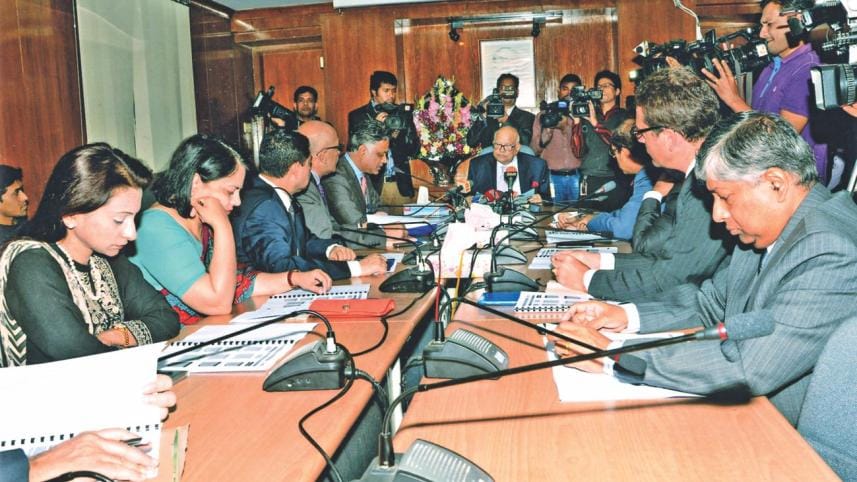Low-cost loans, lands a must to boost investment: MCCI

The leaders of the Metropolitan Chamber of Commerce and Industry (MCCI) demanded a single-digit interest rate on bank loans, low-cost lands and inclusion of the private sector in mega infrastructure projects, to boost investment.
MCCI President Syed Nasim Manzur placed the demands and a set of recommendations to Finance Minister AMA Muhith and Commerce Minister Tofail Ahmed at their secretariat offices in Dhaka yesterday.
The MCCI made the recommendations based on a seminar organised by the chamber in Dhaka in September last year.
"The cost of doing business in Bangladesh has increased," Manzur said, adding that the country actually needs to raise investment. If the interest rate is brought down to a single digit, investment will go up, he said.
Sales during Christmas in Europe, Japan and the US were very poor in 2015 as the global economy has been passing through a bad time, he said.
"Our business competitiveness in global market should be increased."
One of the major impediments to investment is the scarcity of land and its high prices, Manzur said. The high price of land increases the cost of project financing in the country, he added.
He urged the government to allow the private sector entrepreneurs to set up industrial units on both government and private lands, as many factories have been established on vast areas of lands leading to wastage.
The government can lend lands to the private sector or even form public-private partnerships to set up factories, he added.
He recommended inclusion of people from the private sector in the implementation committees of mega infrastructure projects as such committees consist of people only from the public sector.
Former MCCI president M Anis Ud Dowla said his partner Godrej wanted to set up a factory in Rajshahi, as the government encouraged setting up industrial units in the northern regions.
But the Indian conglomerate did not get a gas connection to the unit yet, although he paid the money that was required to set up a two-kilometre gas pipeline and to purchase demand notes.
He also urged the government to avoid double taxation as the government realises taxes simultaneously from the parent company and from the subsidiaries.
The former MCCI chief also said the deployment of Rapid Action Battalion personnel to collect VAT from the businessmen will be very unfortunate.
Rab has requested the National Board of Revenue to include the current VAT Act 1991 in the Mobile Court Act 2009 so that its executive magistrates can conduct drive against VAT evaders.
MCCI's Committee Member Simeen Hossain said the cost of doing business in the manufacturing sector increases due to lack of gas connections.
"We would like to request Bangladesh Bank to allow us to acquire product licences overseas and this should be a part of normal business so that this encourages our export of pharmaceuticals."
Nihad Kabir, who is also a committee member of the MCCI, said the NBR puts pressure on the businesspeople, who always pay taxes, although there are so many people who have taxable incomes.
The NBR has increased the tax collection target, which she thinks is proper.
She also suggested the government monitor progress of the mega infrastructure projects so that those are completed in time.
Saiful Islam, another member of the committee, said long-term strategies should be taken for the shipbuilding and leather sectors, as the two emerging sectors are going through a slump now.
He also demanded duty-free import of fire fighting equipment for other sectors, as the government is providing the apparel sector with the benefit now.
Kamran T Rahman, another member of the MCCI committee, recommended enforcement of the Mandatory Jute Packaging Act 2010 with immediate effect, to ensure use of jute bags in packing bulk items.



 For all latest news, follow The Daily Star's Google News channel.
For all latest news, follow The Daily Star's Google News channel.
Comments